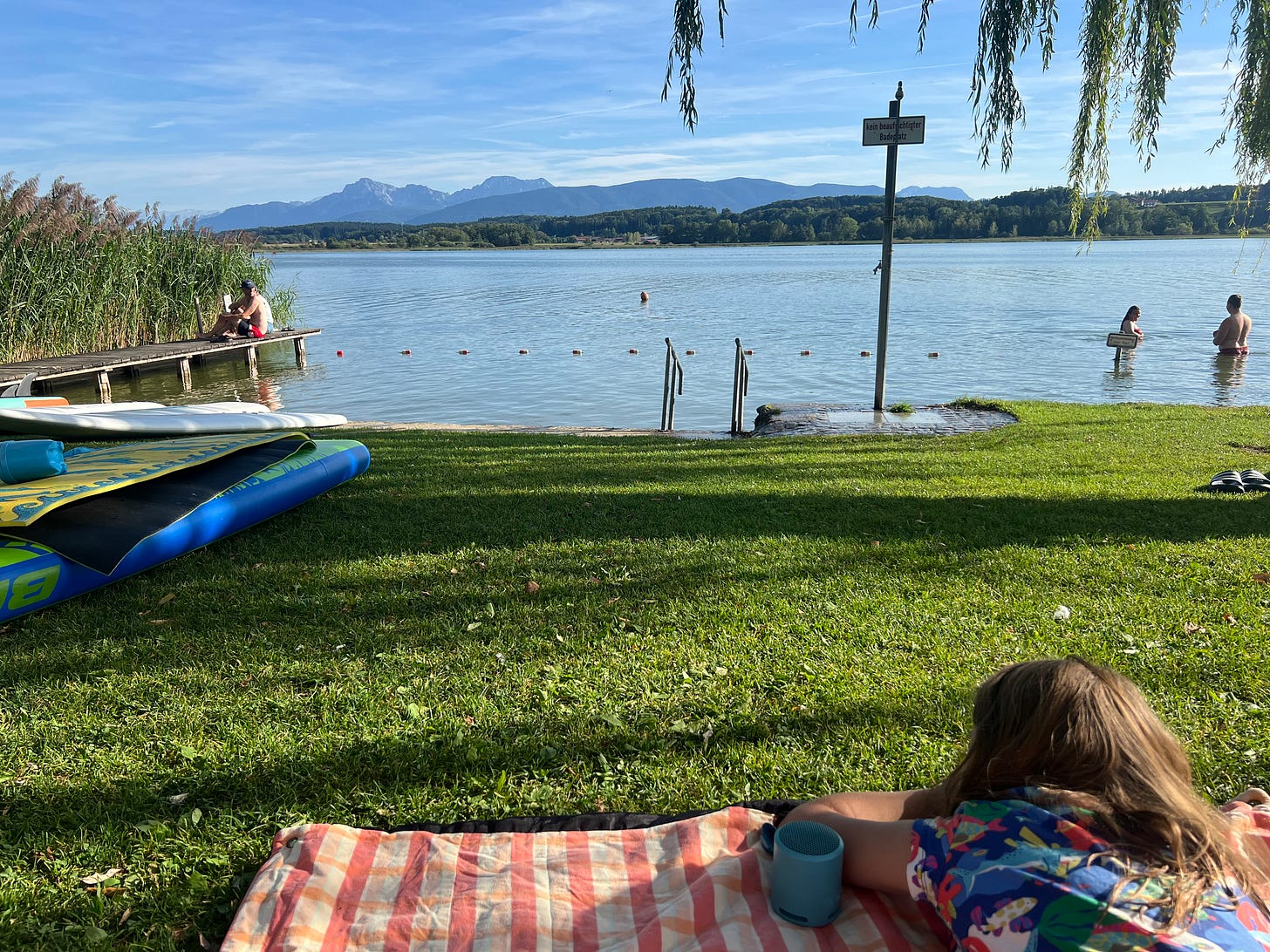After the summer
Oh, summer! Time to relax and regenerate. While I meant to keep the book posts going, it just didn’t happen. Instead, I sank deeper into knowing that the transformation we need now is much more fundamental than decarbonizing or overcoming capitalism. We need a different way of being with ourselves and with others. We are invited to shed the performance and the competition, and to connect and grow together. It’s a spark I want to take even more into our work: to enable experiences of connection and resonance and the energy that comes with that.
This knowing that has been simmering for a while. Last summer, I went “24 hours into the wild”, a retreat with a day and a night in the forest on a weekend in August. It was 5 degrees cold, raining non-stop and stormy. The setting could not have been more fitted for the question I was carrying: How can I make a contribution toward a better world in an increasingly hostile, competitive and cynical environment? The answer lay in the many seedlings of beech that were sprouting in between the rows of spruce. It also revealed itself in the black, decaying log, which, upon closer inspection, hosted a myriad of life: tiny fungus, ant roads, beetles chewing on even smaller creatures, moss in bloom. I don’t have a mission. There is nothing I need to deliver. I simply do the work that I love. I celebrated this liberation the next day with a dip in the stream, the word of the host in my ears: “It is summer!” - time to indulge, celebrate and be merry.
The experience shifted something fundamentally for me. I now work purely from joy, and it brings lightness not just for myself, but also for the teams and groups that I guide. I thought of that cold summer day in the forest now when sitting down to restart the sharing practice around system innovation. So before talking about cases, methods and concepts again, I am sharing the bigger question that emerged from this summer. Especially from my reading, which was surprisingly coherent given that I was following recommendations and not looking for something in particular.
“Unverfügbarkeit” (”The Uncontrollability of the World”) by Hartmut Rosa is a precise diagnostic of our time. He explores the paradox at the heart of modern life: we strive to make the world fully available, predictable, and controllable — yet the most meaningful experiences in life depend on their very unavailability. What makes us happy is to feel resonance with the world – love, music, beauty, creativity, awe - all experiences that cannot be forced or fully controlled. The book leaves without suggestions how we might escape from this trap.
I found some in “Hospicing Modernity” by Vanessa Machado de Oliveira. The basic plea here is that we have to let go of the modern mindset of separation, control and competition. Without knowing (or remembering) what another way of life could be, attention to letting go can create space for new ways to evolve. Weaving in the indigenous way of life, there is a suggestion that the new might grow in part out of ancient wisdom and practice. I would add that we all still experience connection with nature, reciprocal relationships, caring for one another, and these are ways of being that we can appreciate and foster more, whilst unlearning and disinvesting from extractive and harmful systems.
Rutger Bregman’s “Humankind” asks that we change our mindset from looking at people as basically egoistic to basically social and “good”. When we trust each other, focus on together rather than separate, life becomes easier, more joyful, and more productive. It is interesting how he takes apart often cited evidence of the selfish nature of humankind such as the Stanford Prison or the Milgram experiment to show that the real story was quite different and was made to confirm what people were looking for. In the same way, we can now build the evidence and share the stories that feed a mindset of collaboration and connection.
Finally, coming back to Erich Fromm’s “To Have or To Be?” after many years, it’s astonishing to see that all of the arguments above were already written down 50 years ago. It raises the question: where might change come from? Not from the insight or the evidence, it seems. It must come from experience: places, people, processes that “prototype” the being rather than having, the connecting rather than separating.
After the summer, there seems to be no way we can facilitate system innovation without this bigger shift in how we are in our mind, heart and will. There is wide recognition that it’s not “just” our economic or political model that is failing to “deliver”. It is the mindset of separation that has to go. Tricky, as many of our educational, political and economic systems are built on the premise of separation and competition.
Questions:
How might we create invitations to experience a life of more being and connecting in our work as system innovation facilitators?
How might we practice this way of being in our own lives so we can radiate it and become infectious for others?
How might we go deeper than the usual practices for presencing and connection - for example by asking more ambitious questions and challenging participants to small experiments?
I am curious to hear your reactions and thoughts!
Become part of the journey to the book on system innovation! As a subscriber, you can add your comments.



